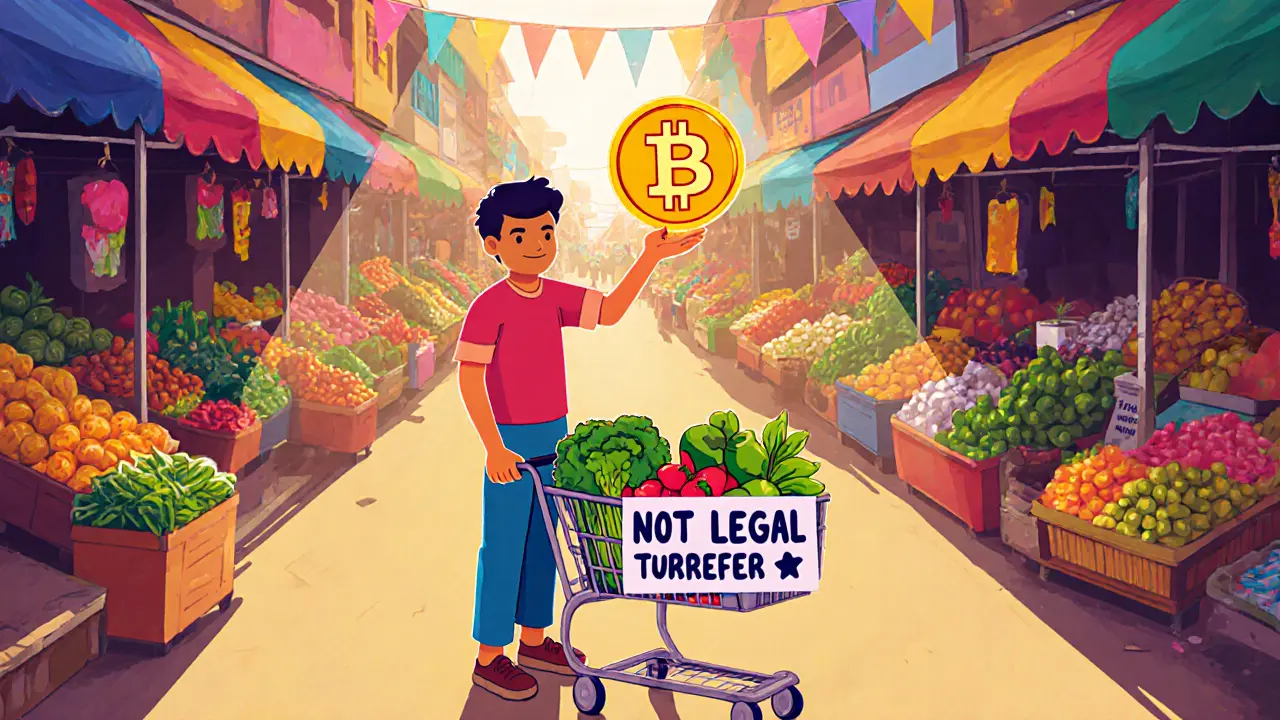Crypto Tax Calculator for India
India's Cryptocurrency Tax Calculator
Calculate your effective tax rate based on India's regulations: 30% income tax, 1% TDS, and 18% GST.
Enter details and click calculate to see your tax breakdown
India’s approach to digital money is a bit of a paradox: you can own and trade crypto, but you can’t use it to pay your grocery bill. Understanding this odd mix of permission and restriction is key for anyone eyeing the Indian market.
cryptocurrency regulations India have evolved through court rulings, RBI warnings, and a barrage of new tax rules, leaving investors and exchanges scrambling to stay compliant.
Key Takeaways
- Cryptos are classified as Virtual Digital Assets (VDAs) - legal to own, illegal as legal tender.
- The Supreme Court struck down the RBI’s 2018 crypto ban, reopening banking access.
- India taxes crypto gains at a flat 30% plus 1% TDS and up to 18% GST, making the effective rate over 49%.
- Four regulators - RBI, Ministry of Finance, FIU‑IND, and SEBI - share oversight, creating a complex compliance landscape.
- Future reforms are likely, but a clear, unified crypto law is still pending.
What Are Cryptocurrencies Called in India?
Virtual Digital Assets (VDAs) are the legal term used by Indian authorities for what the world calls cryptocurrencies. VDAs are digital representations of value that can be transferred, stored, or traded electronically. The definition appears in the Income Tax Act, 1961, and in recent guidance from the Ministry of Finance.
From Warning to Court Victory: A Brief History
The RBI first sounded the alarm in 2013, issuing a public caution that crypto could be risky. Two more cautions followed in 2017 as ICO hype surged. Then came the April62018 circular - popularly known as the Crypto Prohibition - which barred all RBI‑regulated entities from dealing with VDAs. Banks stopped processing crypto‑related transactions, effectively choking the market.
That all changed on March52020, when the Supreme Court of India delivered its landmark judgment in Internet and Mobile Association of India v Reserve Bank of India. The court ruled the RBI’s prohibition unconstitutional, restoring the ability of crypto firms to access banking services. The decision revived more than 100million Indian crypto users.

Current Regulatory Landscape (2025)
Today, four agencies share the regulatory pie:
- Reserve Bank of India (RBI) continues to supervise monetary stability, issuing public cautions and monitoring systemic risk.
- The Ministry of Finance crafts tax policy, setting the 30% flat tax and TDS rules.
- The Financial Intelligence Unit‑India (FIU‑IND) enforces AML compliance, requiring all VDA service providers to register under the Prevention of Money Laundering Act.
- Since April12025, the Securities and Exchange Board of India (SEBI) oversees tokens that have security-like features, applying securities law to those assets.
This multi‑agency model aims to balance innovation with risk mitigation, but it also means businesses must juggle overlapping mandates.
Taxation: One of the World’s Heaviest
India’s tax framework treats crypto profits like any other income - a flat 30% rate under the Income Tax Act, 1961, with no cost‑basis deductions besides the purchase price. On top of that, a 1% Tax Deducted at Source (TDS) applies to every VDA transfer above a certain threshold, regardless of profit.
In February2025, Parliament passed the VDA Income Tax Amendment Bill, extending the 30% rule to NFTs and tightening reporting on undisclosed crypto income. Later, on July72025, the exchange Bybit added an 18% Goods and Services Tax (GST) on every crypto‑related transaction - from spot trades to staking rewards.
The combined effect can push the effective tax rate past 49% for active traders, making India one of the most expensive jurisdictions for crypto activity.
Compliance Burden for Exchanges and Wallets
Any platform serving Indian users must register with FIU‑IND, implement robust KYC/AML systems, and retain transaction records for the mandated period. The compliance checklist includes:
- Customer due‑diligence (KYC) - identity verification, source‑of‑funds checks.
- Real‑time transaction monitoring for suspicious patterns.
- Periodic filing of Suspicious Transaction Reports (STRs) to FIU‑IND.
- Acting as TDS collector for qualifying VDA transfers.
- Handling GST invoices for every user‑level operation.
These demands have pushed many foreign exchanges to either exit the market or impose geo‑restrictions. Domestic players like WazirX and CoinDCX have invested heavily in compliance infrastructure, consolidating market share among the few who can afford it.

Impact on Everyday Users and Businesses
For an individual investor, the practical steps are:
- Maintain a detailed ledger of every buy, sell, swap, and stake.
- Calculate gains using the prescribed accounting method (FIFO is commonly used).
- File the 30% tax on net gains in the annual income‑tax return.
- Ensure the exchange deducts 1% TDS on qualifying transactions and provides a Form16‑like statement for tax credit.
Businesses that accept crypto payments face another hurdle: crypto is not legal tender, so contracts must explicitly allow settlement in VDAs. Creditors cannot force customers to accept crypto, limiting its use to optional, bilateral agreements.
How India Stacks Up Globally - A Tax Comparison
| Country | Flat Income Tax Rate | TDS / Withholding | GST / VAT | Effective Rate (high‑frequency traders) |
|---|---|---|---|---|
| India | 30% | 1% on each transfer | 18% GST | ≈49%+ |
| United States | 10‑37% (based on income bracket) | None | None at federal level | 10‑37% |
| United Kingdom | 10‑20% (capital gains) | None | 20% VAT on services | ≈30% |
| Germany | 0% after 1‑year holding, else 25% plus solidarity surcharge | None | 19% VAT on services | ≈44% (short‑term) |
| ElSalvador | 0% (Bitcoin legal tender) | None | None | 0% |
The table makes it clear why many Indian traders look abroad for lower‑tax jurisdictions, despite the legal risks.
Looking Ahead: What Might Change?
Several signals suggest that India’s crypto policy will keep evolving:
- A discussion paper promised in mid‑2025 (still unreleased) aims to formalise a dedicated crypto law.
- The October2025 Financial Stability Board peer review could push India to align with FATF standards.
- SEBI’s new token‑oversight regime may split assets into “security‑like” and “commodity‑like,” each with its own rulebook.
- Progress on the digital rupee could see the RBI promoting CBDC use while keeping private VDAs under tighter tax and AML scrutiny.
Industry experts remain split: Some warn that heavy taxes will drive talent overseas, while regulators argue the measures protect financial stability and generate revenue. Whatever the outcome, the core principle is likely to stay - crypto is legal to own and trade, but it won’t replace the rupee as everyday cash.
Frequently Asked Questions
Is it illegal to buy Bitcoin in India?
No. Buying, holding, and selling Bitcoin (treated as a VDA) is legal. The prohibition only applies to using crypto as legal tender or to banks providing services to crypto firms without proper registration.
Do I need to pay tax on crypto gains?
Yes. Gains are taxed at a flat 30% under the Income Tax Act. No deductions are allowed except the purchase cost, and a 1% TDS applies to each transfer above the prescribed limit.
Can I use crypto to pay for goods?
Technically you can, but crypto is not recognized as legal tender. Both parties must voluntarily agree, and the transaction cannot be forced by law.
What compliance steps must an exchange take?
Register with FIU‑IND, implement KYC/AML systems, retain transaction logs, act as TDS collector, and charge GST on all services. SEBI oversight applies to security‑like tokens.
Will India introduce a dedicated crypto law?
The government has signalled intent via a discussion paper and upcoming legislation, but a final law has not yet been published as of October2025.


Ted Lucas
Yo crypto fam! 🚀 The Indian tax regime is a beast – 30% flat, 1% TDS, 18% GST, total crushing. That's a >49% effective bite on every trade, turning profits into tax‑drain. The multi‑agency oversight (RBI, FIU‑IND, SEBI) adds layers of compliance like an onion you can’t stop peeling. But the Supreme Court win in 2020 opened the floodgates, letting exchanges finally talk to banks again. If you’re looking to dodge the tax avalanche, consider cross‑border platforms, but remember the legal gray‑zone. Stay sharp, stay compliant, and keep those ledgers clean! 💡